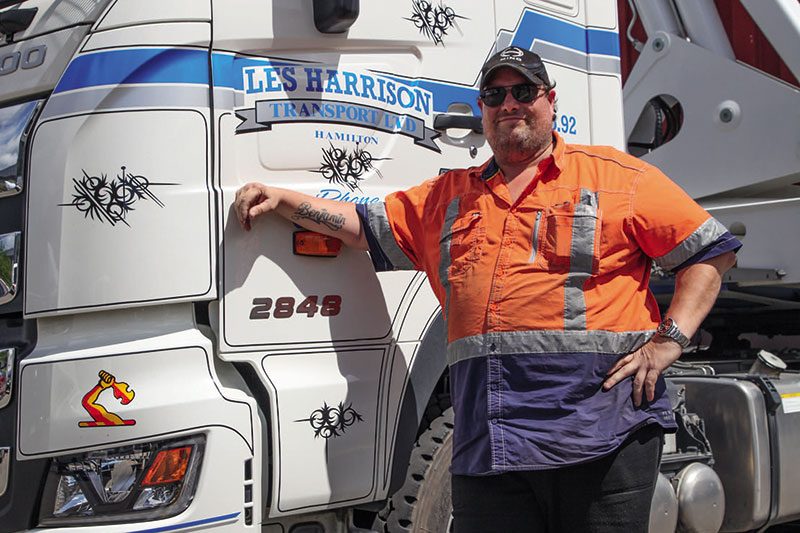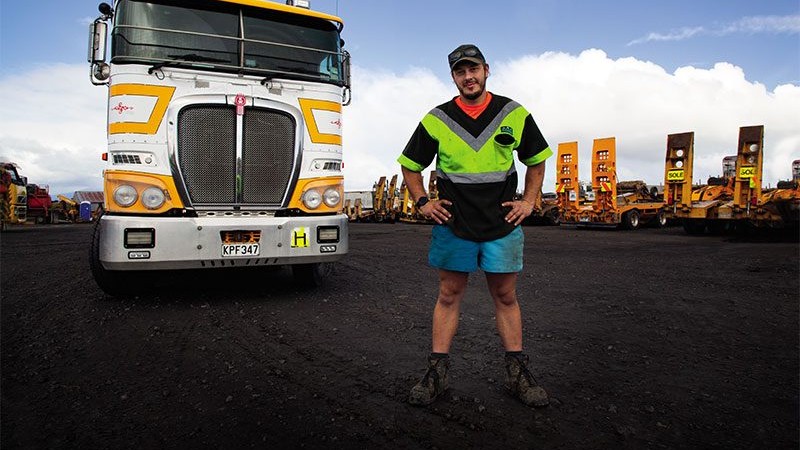
While every life comes with challenges, some are tested more than others and their paths to success often require extra will, effort and support. Connor Brownlee’s story illustrates what can be achieved against the odds.
As young as he is, 22-year-old Connor Brownlee got an early start in trucking. At 15, he learned the basics at ‘ground level’ from those more experienced before finding his way into the driver’s seat and building a name for himself in the industry.
But the past seven years have represented immense personal growth and the ability to overcome a particular challenge. Connor has autism spectrum disorder (ASD), which is defined as a neurological disability affecting the ability to socialise and communicate effectively. Not that you’d immediately know talking to him today.
“I never really went to high school. I got kicked out of two schools for being ‘problematic’. But I didn’t get diagnosed until I was 16; we didn’t know the full lengths of what was going on,” he explains.
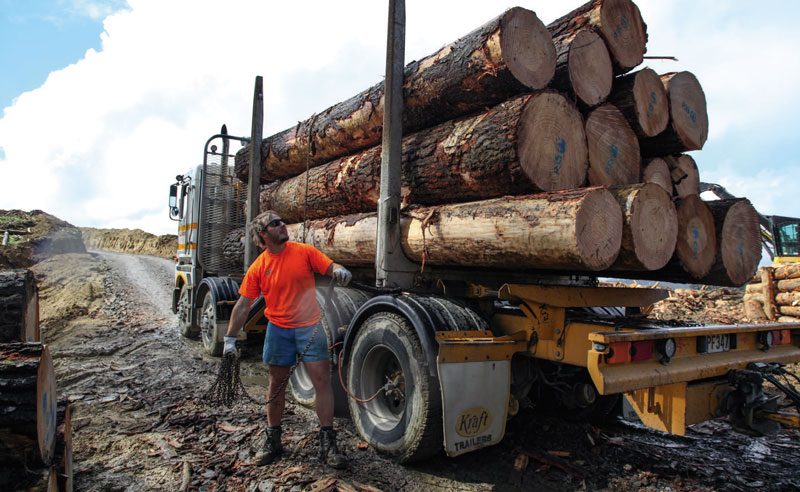
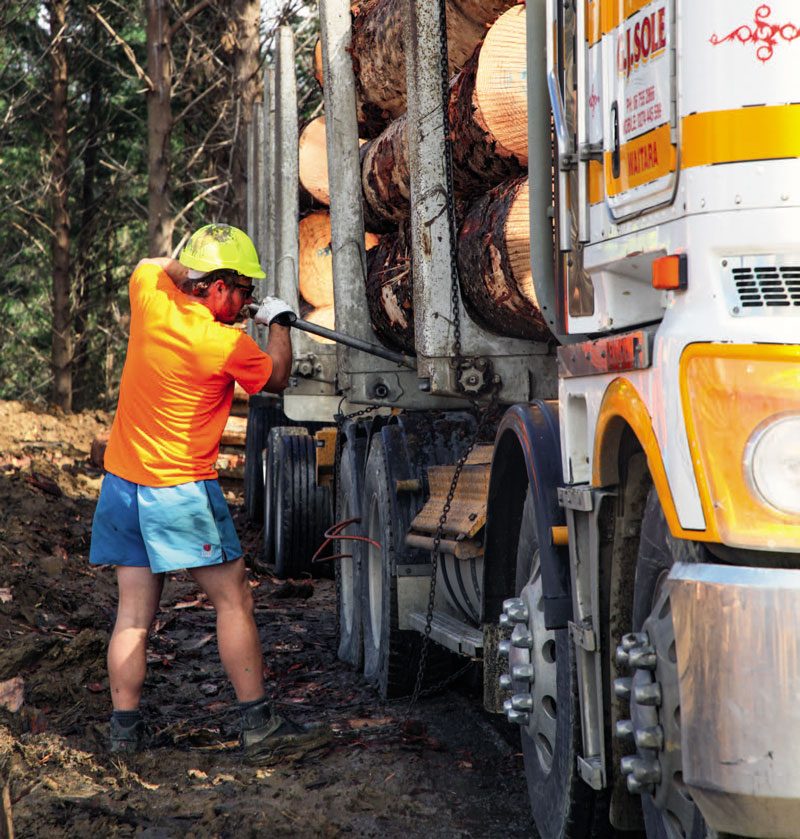
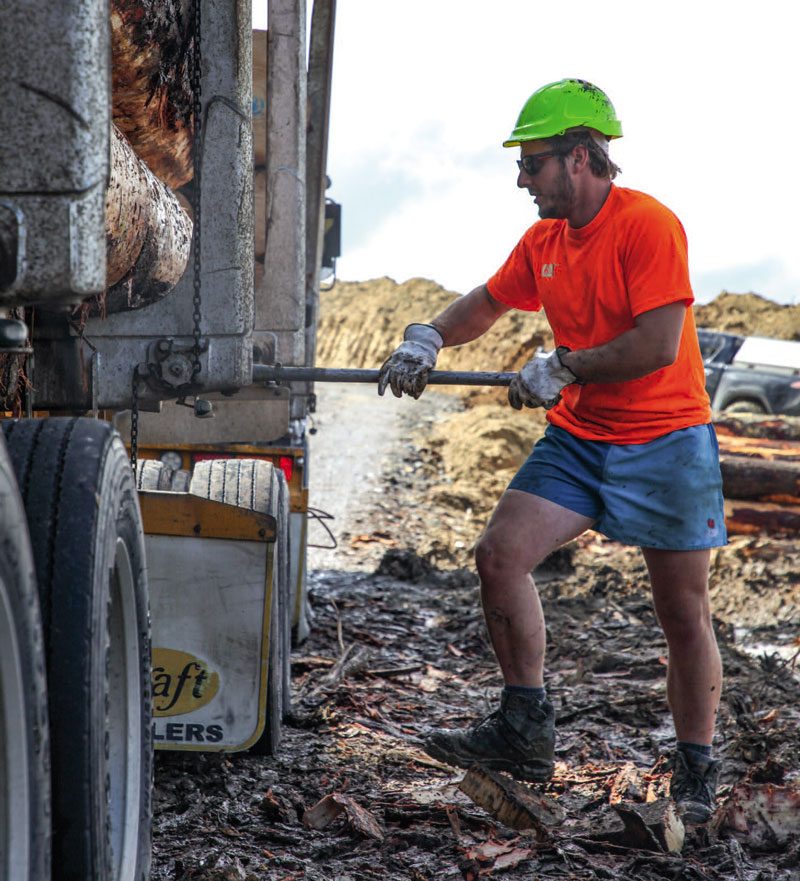
Connor grew up in Waiuku and his desire to work with trucks and machinery came from his dad Jeff, who drove trucks. With help from dad, his mum, Joycie, and from Connor’s ‘second’ mum and dad, Lyndal and Wayne Stewart, he managed to learn how to make that a reality. “Lyndal and Wayne helped me with my mental health. They supplied me with everything, basically gave me another life so that I could work through it,” Connor says.
So what is ASD for Connor? “I’ve been called a ‘spaz’ or a ‘retard’, but it’s not about that. All it is, is you think and work in different ways. You have a different mindset. I don’t get stressed easily but when I do, I really stress. It took me four years to learn the signs of when I’m getting worked up and going to lose it and how to control it. Whereas I used to just turn around and blast your head off, now I walk away for 10 minutes and calm down.”
It’s a credit to Connor that for the past year, he’s managed to live with ASD without the need for medication. “Over the years, I’ve probably been on about 30 different medications. Some have made me worse, some have made me better,” he says.
When it came to his journey into the trucking industry, though, having ASD has unfortunately been a sticking point. “The whole label thing; I’ve felt too scared to walk into certain places and say what I’ve got because people would turn around and say ‘we don’t want you’. I got told I was a liability. I’ve had other people turn around and say, ‘we don’t want a spaz working for us’ or call me a retard. I’ve been dished that my whole life to the point where I once had an ambulance pick me up from a worksite when I had a panic attack in a tractor.”
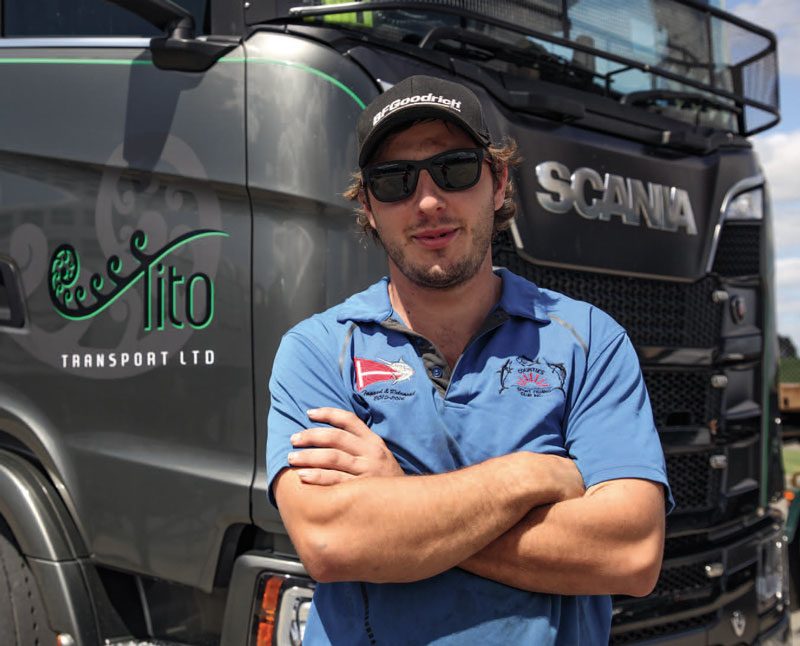
As Connor mentions, stress and anxiety are among the difficulties faced by people with ASD.
“I can go out, do the job and come back. I look after the gear, would work 24 hours if I could and I won’t stop ’til the job’s done… But the second you say, ‘hey, I’m autistic’, you’re judged and not on how you are or how you work. It’s like a wall goes up and they don’t want to know you, Connor says.
Happily, there have also been people accepting of Connor’s ‘label’ – with some who have had an especially big influence, seen his potential and taken him under their wing.
One of these key figures in Connor’s life is Skip Golden. When Connor moved to the North Shore at 17 to live with Lyndal and Wayne, he found work with various civil and earthmoving crews. During that time, he and Skip crossed paths.
“Skip took me in and put me in the workshop. I basically had to know how to fix the truck if anything went wrong before I could drive one. I learnt to drive by moving the trucks around… Skip threw me into the trucks and said, ‘figure it out’.
“I had a massive cock-up one day, thought I’d get fired over it. Skip had just bought his first Scania, it was all shined up and polished, and he asked me to back it up. I said, ‘Skip, I’ve never backed a trailer before.’ He said, ‘Give it a go, take your time, you’ll be right.’ I backed in between two of his old Fusos and swiped the side of the bin on a parked truck. I was quite upset, but Skip said, ‘We all make mistakes, but you’ve come to me and owned up to it.’ Then he gave me a polisher…” Connor laughs.
“Often, I’d think I was making a mess, but he gave me reassurance and confidence. Most of what I know came from Skip, he’s supported me and been my mentor through it all. I’ve struggled and walked out of the industry many times. Skip has always been there and dragged me back in and built me up.”
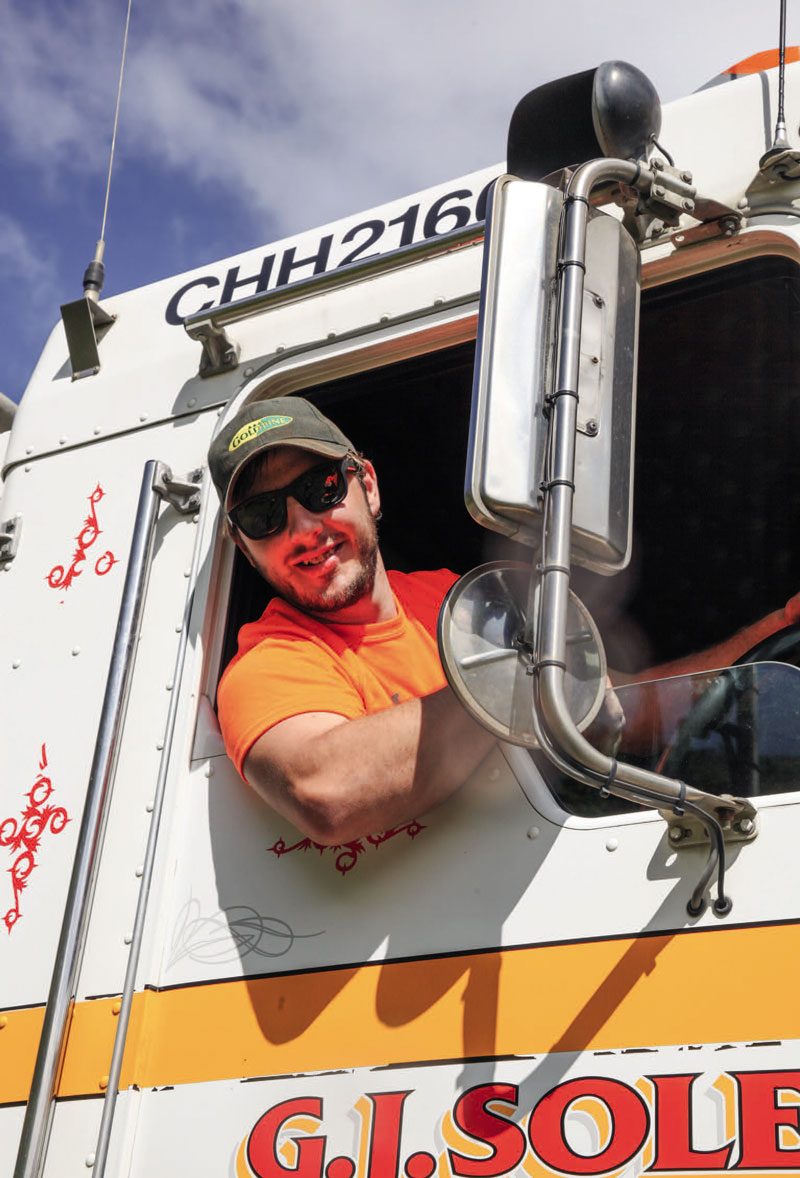
Another notable influence in Connor’s life has been Graeme and Noleen Sole of Taranaki’s G.J. Sole Transport, one of the companies at which Connor was doing some work when we caught up with him. “Apart from Skip, Graeme and Noleen are the only others that have understood me and treated me as if I’m a normal person,” Connor says.
“Graham’s attitude is, ‘If you can do your job and come home safely, it’s only a label.’ I could ring him up if unsure and ask him the same question five times, and he doesn’t fire up about it. It’s a good environment, and he runs it like a family. He’s said to me, ‘For someone your age, you know exactly what you’re doing.’ After all the negative stuff I’ve had, that kind of positive feedback means quite a bit to me.
“There aren’t many people out there who just take you for who you are.”
Between his grounding at Golden Contracting and his latest contracting position at New Plymouth-based Tito Transport, Connor worked at various other civil and transport companies. He also worked with Neville Bros. between 2018 and 2020, which put him through his class 2 and set him out doing tip work and driving a four- wheeler cattle truck.
The year 2019 was a big one for Connor. He started his first company as a side business, Machine Guys. “I bought a 1982 Hino GD 4×2. It had a real high deck, about 1500mm off the ground. The first digger I put on it was a three-tonner, and I about crapped my pants – there was that much roll. I floated around with that doing work here, there, and everywhere while working for other companies as well.”
Also, during 2019, Connor got involved with the disability support agency Manawanui and its Fund for Good programme, which paid for him to achieve his class-4 licence. Later working for Pollock Cranes, he was put through his class 5. Besides the financial aspects, achieving his heavy transport licences came with its own challenges.
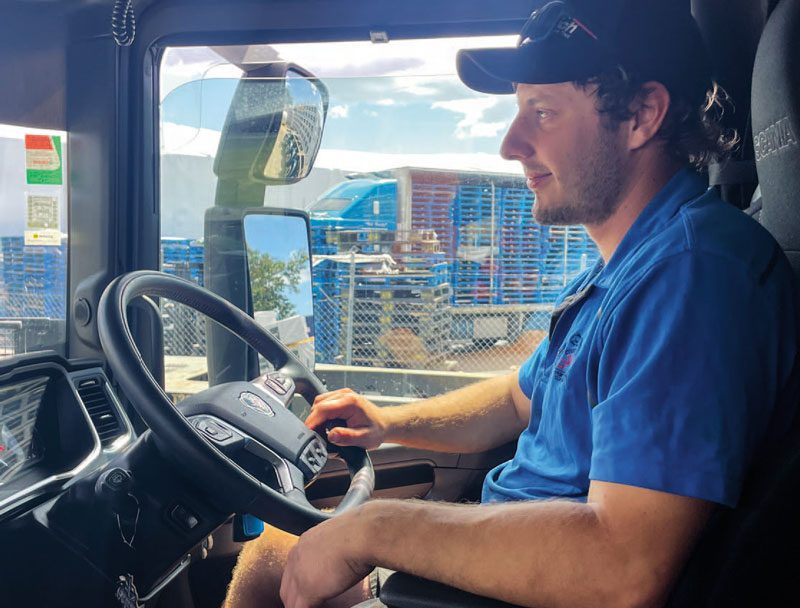
“I didn’t think I could do it because I cannot do theory. With ASD, I can’t take in information theoretically, I learn visually. I can read something and look at a picture, but I won’t remember it 10 minutes later unless I can physically see it being done. So, for my class 5 I sat at VTNZ for five hours redoing my theory until I got it.”
Connor reckons that studying for the theory test could be made easier for many people with short video clips explaining some of the concepts. “Some of the complicated scenarios with trucks and trailers – say chain points and weights – even a 10-second clip that visually demonstrates it would make all the change in the world.”
More recently, Connor started Connor Brownlee Contracting, doing small earthworks jobs, agricultural work and contracting to other companies. During this time, he moved around between the Waikato and Bay of Plenty but, following a split with his partner, he decided to pack up and move to Taranaki to be closer to his grandfather – which is what led him to the yards of G.J. Sole and Tito Transport.
“At 22, I’ve got every licence and ticket apart from a bike licence. If I’ve battled through it and done it, anybody can. Getting judged puts you off, yes, but how many other people are out there trying to do what they want to do and are getting shut down and feeling like they can’t accomplish it?
“If you talk to people, you’ll find good support networks. The trucking industry is hard. There are a lot of old-school people. But stick to it, talk to the understanding people, and you’ll be right,” Connor says.
Read more
Heavy with ambition
0 Comments14 Minutes
Hardwork and ambition
0 Comments3 Minutes
Friends and Family
0 Comments16 Minutes
Sidelift savant
0 Comments5 Minutes





